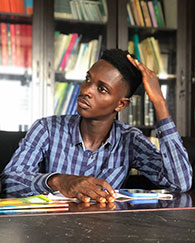 Ahamed Ali Salim
Ahamed Ali Salim is an undergraduate student in Fisheries and Aquatic Sciences. He is in his final year of the undergraduate programme at University of Ghana. In the HOTSPOT project, he will be studying the effect of emerging contaminants on the Gulf of Guinea using calanoid copepods.
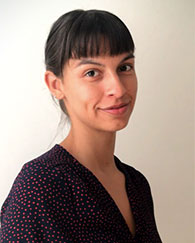 Sofia Ramirez-Ekner is currently on the 3rd semester of her MSc in Ocean Engineering at Technical University of Denmark. As a part of this, she will be specializing in Oceanography with a particular focus on Biological Oceanography. She has previously completed her bachelor's degree in Environmental and Molecular Biology from the University of Roskilde in Denmark.
Sofia Ramirez-Ekner is currently on the 3rd semester of her MSc in Ocean Engineering at Technical University of Denmark. As a part of this, she will be specializing in Oceanography with a particular focus on Biological Oceanography. She has previously completed her bachelor's degree in Environmental and Molecular Biology from the University of Roskilde in Denmark.
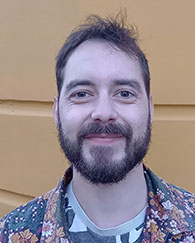 Axel Arias has a special interest in environmental chemistry. He holds a bachelor's degree in Nanoscience. During the study he liked organic and inorganic chemistry and took elective courses in soil and air pollution. Toxicology is his primary interest, and he views his current master in Environmental Chemistry at Technical University of Denmark as a great entrance into the study of toxic and harmful compounds.
Axel Arias has a special interest in environmental chemistry. He holds a bachelor's degree in Nanoscience. During the study he liked organic and inorganic chemistry and took elective courses in soil and air pollution. Toxicology is his primary interest, and he views his current master in Environmental Chemistry at Technical University of Denmark as a great entrance into the study of toxic and harmful compounds.
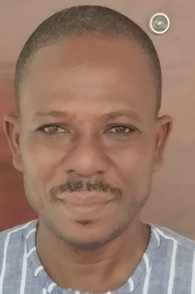 Emmanuel Kwasi Klubi holds a Bachelor Degree in Oceanography and Fisheries from University of Ghana, and Master of Philosophy in Nuclear and Radiochemistry-thesis title: Radiometric Dating, Sediment Fluxes and Ecological Studies of Trace metals at Selected Estuaries and Sections of Coastal Waters of Ghana using CRS, Granulometry and Pollution Models, from University of Ghana, Atomic Campus, Accra, Ghana. Currently, Emmanuel is finishing his Doctoral Degree (PhD) in Oceanography and Limnology, University of Cape Coast, Ghana, and focusing on the spatio-temporal influences of harbour and other hard engineering on coastal recession and resilience of beachfront communities and ecosystem within the central block of the Ghana’s Central Region. Key factors featuring in his investigations are the nearshore bathymetry, bed slope, changes in bedload, sediment grain size characterisation, temperature and salinity profiles, phytoplankton and zooplankton community structure. Emmanuel is hoping to make an impact with his finding to help make an informed decision in compacting the coastal erosion amidst climate change and sea level rise along the coastal section of Ghana. Emmanuel has some form of sea voyage experiences and committed to the researches involving physical and biological oceanography and has been working with University of Ghana in the Department of Marine and Fisheries Sciences.
Emmanuel Kwasi Klubi holds a Bachelor Degree in Oceanography and Fisheries from University of Ghana, and Master of Philosophy in Nuclear and Radiochemistry-thesis title: Radiometric Dating, Sediment Fluxes and Ecological Studies of Trace metals at Selected Estuaries and Sections of Coastal Waters of Ghana using CRS, Granulometry and Pollution Models, from University of Ghana, Atomic Campus, Accra, Ghana. Currently, Emmanuel is finishing his Doctoral Degree (PhD) in Oceanography and Limnology, University of Cape Coast, Ghana, and focusing on the spatio-temporal influences of harbour and other hard engineering on coastal recession and resilience of beachfront communities and ecosystem within the central block of the Ghana’s Central Region. Key factors featuring in his investigations are the nearshore bathymetry, bed slope, changes in bedload, sediment grain size characterisation, temperature and salinity profiles, phytoplankton and zooplankton community structure. Emmanuel is hoping to make an impact with his finding to help make an informed decision in compacting the coastal erosion amidst climate change and sea level rise along the coastal section of Ghana. Emmanuel has some form of sea voyage experiences and committed to the researches involving physical and biological oceanography and has been working with University of Ghana in the Department of Marine and Fisheries Sciences.
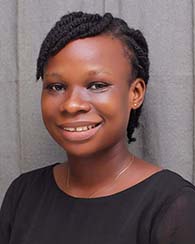 Ama Kwartemaa Agyei Frimpong holds a Bachelor of Science Degree in Biochemistry from the Kwame Nkrumah University of Science and Technology and is currently pursuing a Master of Philosophy in Blue Economy, Governance, and Social Resilience from the University of Cape Coast Ghana, with an interest in ocean governance, food security, and the exploration of bioactive compounds derived from the ocean for their health and economic benefit. She has also been on a two-week visit to the Technical University of Denmark to discuss and present the findings of research conducted with the HOTSPOT team to assess the microbial turnover of dissolved organic matter from the Gulf of Guinea. The findings from the study were also presented at the 2023 ASLO Conference in Palma, Spain.
Ama Kwartemaa Agyei Frimpong holds a Bachelor of Science Degree in Biochemistry from the Kwame Nkrumah University of Science and Technology and is currently pursuing a Master of Philosophy in Blue Economy, Governance, and Social Resilience from the University of Cape Coast Ghana, with an interest in ocean governance, food security, and the exploration of bioactive compounds derived from the ocean for their health and economic benefit. She has also been on a two-week visit to the Technical University of Denmark to discuss and present the findings of research conducted with the HOTSPOT team to assess the microbial turnover of dissolved organic matter from the Gulf of Guinea. The findings from the study were also presented at the 2023 ASLO Conference in Palma, Spain.
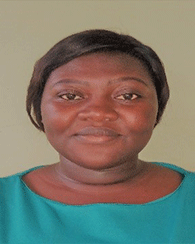 Docia Agyapong is an MPhil student. The title of her project is "Sensitivity of coastal organisms to global change factors". The research aims to determine the sensitivity of selected estuarine phyto- and mesozooplankton to anthropogenic perturbations – surface warming, pollution and salinity change expected under global climate change. The study involves using retrospective analysis of previous reports, field surveys and laboratory experiments to quantify the tolerance ranges of the organisms to the anthropogenic perturbations.
Docia Agyapong is an MPhil student. The title of her project is "Sensitivity of coastal organisms to global change factors". The research aims to determine the sensitivity of selected estuarine phyto- and mesozooplankton to anthropogenic perturbations – surface warming, pollution and salinity change expected under global climate change. The study involves using retrospective analysis of previous reports, field surveys and laboratory experiments to quantify the tolerance ranges of the organisms to the anthropogenic perturbations.
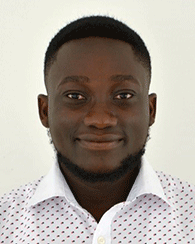 Benjamin Dziedzorm Gawornu is an MPhil student. The title of his project is "Combined impact of pollution and sea surface warming on selected marine plankton in Ghana’s coastal waters". The project involves series of microcosm laboratory experiments to determine the impact of sea surface warming and pollution on functional properties (e.g. growth rate, dry weight, chlorophyll-a, biovolume, total protein and lipid content) of marine phyto- and zooplankton. The overarching goal is to generate data to help parameterise an end-to-end ecosystem model for the Gulf of Guinea as envisaged by the Hotspot Project.
Benjamin Dziedzorm Gawornu is an MPhil student. The title of his project is "Combined impact of pollution and sea surface warming on selected marine plankton in Ghana’s coastal waters". The project involves series of microcosm laboratory experiments to determine the impact of sea surface warming and pollution on functional properties (e.g. growth rate, dry weight, chlorophyll-a, biovolume, total protein and lipid content) of marine phyto- and zooplankton. The overarching goal is to generate data to help parameterise an end-to-end ecosystem model for the Gulf of Guinea as envisaged by the Hotspot Project.
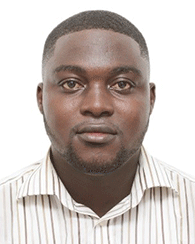 Justice Yeboah is an MPhil student. The title of his project is "Potential impacts of antifouling paints on marine copepods". The research seeks to investigate the potential impacts of antifouling paints on biological rates (e.g. feeding rates, fecal pellet production, egg production and development) of marine copepods. The overarching objective is to generate scientific data in support of efforts to regulate the use of antifouling chemicals on artisanal fishing canoes and vessels in Ghana.
Justice Yeboah is an MPhil student. The title of his project is "Potential impacts of antifouling paints on marine copepods". The research seeks to investigate the potential impacts of antifouling paints on biological rates (e.g. feeding rates, fecal pellet production, egg production and development) of marine copepods. The overarching objective is to generate scientific data in support of efforts to regulate the use of antifouling chemicals on artisanal fishing canoes and vessels in Ghana.
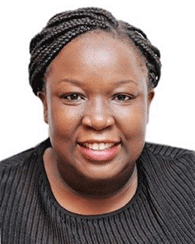 Rael Teresa Adhiambo is a PhD student. The title of her project is "Ecotoxicological assessment of climate change related stressors on selected plankton within tropical estuarine systems". Plankton communities provide the basis of estuarine food webs, which support several ecological and socio-economic activities. However, estuaries also face global level challenges arising from anthropogenic sources. Climate change for instance, will exacerbate existing stressors such as pH, temperature, salinity, and heavy metal pollutants in these ecosystems because of the projected changes in hydrology and sea level rise. This will in turn affect plankton diversity, growth, and development. The proposed study is aimed at supporting global efforts towards climate change action by assessing the impacts that these climate change related stressors will have on plankton phylogenetic evolution and functional attributes.
Rael Teresa Adhiambo is a PhD student. The title of her project is "Ecotoxicological assessment of climate change related stressors on selected plankton within tropical estuarine systems". Plankton communities provide the basis of estuarine food webs, which support several ecological and socio-economic activities. However, estuaries also face global level challenges arising from anthropogenic sources. Climate change for instance, will exacerbate existing stressors such as pH, temperature, salinity, and heavy metal pollutants in these ecosystems because of the projected changes in hydrology and sea level rise. This will in turn affect plankton diversity, growth, and development. The proposed study is aimed at supporting global efforts towards climate change action by assessing the impacts that these climate change related stressors will have on plankton phylogenetic evolution and functional attributes.
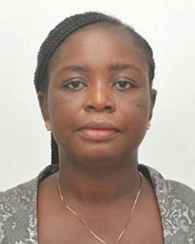 Eunice Nuerkie Ofoli-Anum is a PhD student. The title of her project is "Ecological and socio-economic impacts of small-scale coastal infrastructure developments along the coast of Ghana". The study seeks to assess the impacts of small-scale coastal infrastructures such as harbours and fish landing sites on the health of nearshore coastal ecosystems. It will consider the impacts of the structures using physicochemical parameters (e.g. turbidity, nutrient and pollutant concentrations), biological indicators (benthos biodiversity, as well as fish distribution, size structure and gonad development) and socioeconomic factors generated through interviews with coastal communities and development stakeholders.
Eunice Nuerkie Ofoli-Anum is a PhD student. The title of her project is "Ecological and socio-economic impacts of small-scale coastal infrastructure developments along the coast of Ghana". The study seeks to assess the impacts of small-scale coastal infrastructures such as harbours and fish landing sites on the health of nearshore coastal ecosystems. It will consider the impacts of the structures using physicochemical parameters (e.g. turbidity, nutrient and pollutant concentrations), biological indicators (benthos biodiversity, as well as fish distribution, size structure and gonad development) and socioeconomic factors generated through interviews with coastal communities and development stakeholders.
Previous students in the HOTSPOT project
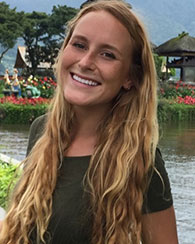 Anna Helene Syneva Wellm is a bachelor student at DTU Environment since September 2016. She is writing her bachelor thesis in collaboration with DTU Aqua and the HOTSPOT project with focus on multiple stressors and climate change (such as oil pollutants, microplastics and heat waves) in the tropics. The objectives of the project is to investigate the impact of the stressers as single and in combination on zooplankton to evaluate the impact on coastal tropical ecosystems. In September 2020, Anna will start her masters in Aquatic Science and Technology at DTU with focus on oceanography.
Anna Helene Syneva Wellm is a bachelor student at DTU Environment since September 2016. She is writing her bachelor thesis in collaboration with DTU Aqua and the HOTSPOT project with focus on multiple stressors and climate change (such as oil pollutants, microplastics and heat waves) in the tropics. The objectives of the project is to investigate the impact of the stressers as single and in combination on zooplankton to evaluate the impact on coastal tropical ecosystems. In September 2020, Anna will start her masters in Aquatic Science and Technology at DTU with focus on oceanography.
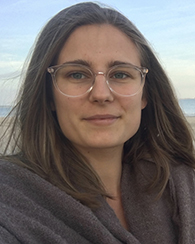 Lou Chevrollier is a MSc student in Energy & Environmental Engineering from France. She joined DTU in september 2019. She has always been fascinated by the ocean and following her master thesis on mercury bioaccumulation in plankton she decided to go to DTU to study oceanography. As part of her courses, she joined the HOTSPOT project to work on heavy metals bioaccumulation in plankton. Lou's project are divided in three parts: First, she looked at the literature to better understand the area specificities and what has been done there, then she joined the team in Cape Coast to sample plankton in the ocean, and finally she is measuring the metals at DTU Environment. Lou finds bioaccumulation of heavy metals scientifically captivating because it involves chemical, physical and biological processes and at the same time plankton which play crucial roles in ecosystems and carbon export.
Lou Chevrollier is a MSc student in Energy & Environmental Engineering from France. She joined DTU in september 2019. She has always been fascinated by the ocean and following her master thesis on mercury bioaccumulation in plankton she decided to go to DTU to study oceanography. As part of her courses, she joined the HOTSPOT project to work on heavy metals bioaccumulation in plankton. Lou's project are divided in three parts: First, she looked at the literature to better understand the area specificities and what has been done there, then she joined the team in Cape Coast to sample plankton in the ocean, and finally she is measuring the metals at DTU Environment. Lou finds bioaccumulation of heavy metals scientifically captivating because it involves chemical, physical and biological processes and at the same time plankton which play crucial roles in ecosystems and carbon export.
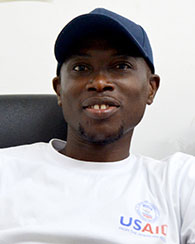 Ernest Obeng Chuku has a background in fisheries and aquatic sciences and is currently pursuing a Master of Philosophy (Aquaculture) degree at the University of Cape Coast (UCC). He has submitted his MPhil thesis, which focused on promoting the culture of mangrove oysters in lagoons and estuaries along the coast of Ghana, as a supplementary livelihood option, especially for women - who dominate the trade. Combined with his studies, Ernest works at the Department of Fisheries and Aquatic Sciences as Principal Research Assistant on the USAID/UCC Fisheries and Coastal Management Project, serves as Editorial Assistant for the Journal of Fisheries and Coastal Management and acts as Communications Support Officer for the Africa Centre of Excellence in Coastal Resilience (ACECoR) at UCC. Ernest is enthusiastic about aquatic food production and marine conservation, and cares about feeding the world! He has been on a three-week stay at Technical University of Denmark (DTU) learning new methods of plankton ecology, which hopes to apply to the culture of algal diet required for rearing the West African mangrove oyster.
Ernest Obeng Chuku has a background in fisheries and aquatic sciences and is currently pursuing a Master of Philosophy (Aquaculture) degree at the University of Cape Coast (UCC). He has submitted his MPhil thesis, which focused on promoting the culture of mangrove oysters in lagoons and estuaries along the coast of Ghana, as a supplementary livelihood option, especially for women - who dominate the trade. Combined with his studies, Ernest works at the Department of Fisheries and Aquatic Sciences as Principal Research Assistant on the USAID/UCC Fisheries and Coastal Management Project, serves as Editorial Assistant for the Journal of Fisheries and Coastal Management and acts as Communications Support Officer for the Africa Centre of Excellence in Coastal Resilience (ACECoR) at UCC. Ernest is enthusiastic about aquatic food production and marine conservation, and cares about feeding the world! He has been on a three-week stay at Technical University of Denmark (DTU) learning new methods of plankton ecology, which hopes to apply to the culture of algal diet required for rearing the West African mangrove oyster.
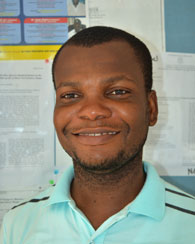 Bernard Ekumah has a B.Sc. Degree in Natural Resources Management from the Kwame Nkrumah University of Science and Technology (KNUST), Ghana. He also holds a certificate in Spatial Ecotoxicology & Ecotoxicological Risk Assessment from University of Koblenz-Laundau, Germany. He is currently studying for a Master of Philosophy (Environmental Science) degree at the University of Cape Coast, Ghana. Besides the studies, he works at University of Cape Coast (UCC) as Principal Research Assistant on the USAID/UCC Fisheries and Coastal Management Capacity Building Support Project. Bernard’s research interest include spatial assessment of ecotoxics in coastal waters and application of geospatial techniques for scientific analysis and environmental planning. Bernard likes to watch live soccer.
Bernard Ekumah has a B.Sc. Degree in Natural Resources Management from the Kwame Nkrumah University of Science and Technology (KNUST), Ghana. He also holds a certificate in Spatial Ecotoxicology & Ecotoxicological Risk Assessment from University of Koblenz-Laundau, Germany. He is currently studying for a Master of Philosophy (Environmental Science) degree at the University of Cape Coast, Ghana. Besides the studies, he works at University of Cape Coast (UCC) as Principal Research Assistant on the USAID/UCC Fisheries and Coastal Management Capacity Building Support Project. Bernard’s research interest include spatial assessment of ecotoxics in coastal waters and application of geospatial techniques for scientific analysis and environmental planning. Bernard likes to watch live soccer.
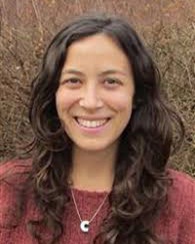
Carla Franco has a background in Marine Sciences and she is currently studying DTU’s MSc in Aquatic Science and Technology focusing on environmental issues and coastal processes getting to understand human’s interaction with nature and to find new solutions to have a balanced coexistence.
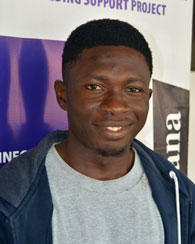 Delove Abraham Asiedu has a degree in Fisheries and Aquatic Sciences and is now finishing a Master’s programme in Oceanography and Limnology at UCC. He is interested in investigating on the zooplankton species composition in coastal waters of Ghana.
Delove Abraham Asiedu has a degree in Fisheries and Aquatic Sciences and is now finishing a Master’s programme in Oceanography and Limnology at UCC. He is interested in investigating on the zooplankton species composition in coastal waters of Ghana.
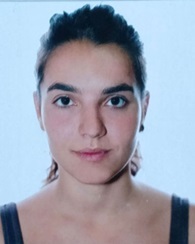 Giovanna Albanihas a background in Environmental Science and is now finishing the Master's programme in Aquatic Science and Technology at DTU. She is mainly interested in the oceanographic line of studies and has spend a semester in Chile at the Engineering University Federico Santa Maria where she had the opportunity to broaden her technological knowledge, e.g., on desalination of seawater with reverse osmosis membrane affected by biofouling. Giovanni has many interests, as hiking, freediving, climbing, music and the study of plants.
Giovanna Albanihas a background in Environmental Science and is now finishing the Master's programme in Aquatic Science and Technology at DTU. She is mainly interested in the oceanographic line of studies and has spend a semester in Chile at the Engineering University Federico Santa Maria where she had the opportunity to broaden her technological knowledge, e.g., on desalination of seawater with reverse osmosis membrane affected by biofouling. Giovanni has many interests, as hiking, freediving, climbing, music and the study of plants.
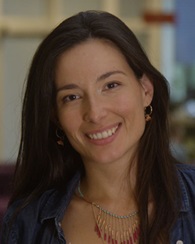 Laura Hernandez Ruiz holds a degree in Environmental Engineering. She is currently finishing her MSc programme in Aquatic Science and Technology at DTU. Besides the studies, she works for a company that offers ballast water systems to prevent the spread of invasive species. She enjoys hiking, rowing and swimming outdoors.
Laura Hernandez Ruiz holds a degree in Environmental Engineering. She is currently finishing her MSc programme in Aquatic Science and Technology at DTU. Besides the studies, she works for a company that offers ballast water systems to prevent the spread of invasive species. She enjoys hiking, rowing and swimming outdoors.